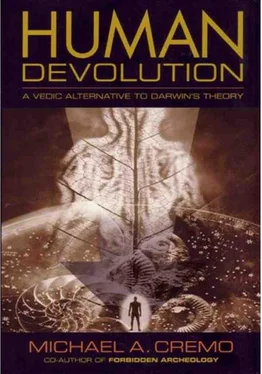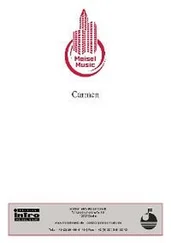Michael Cremo - Human Devolution - A Vedic Alternative To Darwin's Theory
Здесь есть возможность читать онлайн «Michael Cremo - Human Devolution - A Vedic Alternative To Darwin's Theory» весь текст электронной книги совершенно бесплатно (целиком полную версию без сокращений). В некоторых случаях можно слушать аудио, скачать через торрент в формате fb2 и присутствует краткое содержание. Год выпуска: 2003, ISBN: 2003, Издательство: Torchlight Publishing, Жанр: Старинная литература, на английском языке. Описание произведения, (предисловие) а так же отзывы посетителей доступны на портале библиотеки ЛибКат.
- Название:Human Devolution: A Vedic Alternative To Darwin's Theory
- Автор:
- Издательство:Torchlight Publishing
- Жанр:
- Год:2003
- ISBN:9780892133345
- Рейтинг книги:4 / 5. Голосов: 1
-
Избранное:Добавить в избранное
- Отзывы:
-
Ваша оценка:
- 80
- 1
- 2
- 3
- 4
- 5
Human Devolution: A Vedic Alternative To Darwin's Theory: краткое содержание, описание и аннотация
Предлагаем к чтению аннотацию, описание, краткое содержание или предисловие (зависит от того, что написал сам автор книги «Human Devolution: A Vedic Alternative To Darwin's Theory»). Если вы не нашли необходимую информацию о книге — напишите в комментариях, мы постараемся отыскать её.
Human Devolution: A Vedic Alternative To Darwin's Theory — читать онлайн бесплатно полную книгу (весь текст) целиком
Ниже представлен текст книги, разбитый по страницам. Система сохранения места последней прочитанной страницы, позволяет с удобством читать онлайн бесплатно книгу «Human Devolution: A Vedic Alternative To Darwin's Theory», без необходимости каждый раз заново искать на чём Вы остановились. Поставьте закладку, и сможете в любой момент перейти на страницу, на которой закончили чтение.
Интервал:
Закладка:
Bernard Silvester, in his Di mundi universitate, composed during the reign of Pope Eugenius III (1143–1153), gave a more complete list of supernatural creatures. He considered the stars to be living beings, “gods who serve God in person.” In the realm of ether, they enjoy a life of eternal bliss, in constant contemplation of the divine. The human soul, upon leaving the material body, can return to this realm to become once more one of these gods. Next come the angels, who share with the stars the quality of deathlessness. But like humans they are influenced by passionate impulses. These angelic beings are of several kinds: (1) Benevolent angels serve as mediums between the Supreme Being and humans. They exist in the region between the sun and the moon. (2) In the aerial region just below the moon reside angelic beings who enjoy a tranquil and serene state of mind. (3) Next come genii, who are associated with particular humans, and guide them. It would seem that the daimonion of Socrates was of this category. (4) In the lower atmosphere, near the earth, resides a category of dark spirits, called by Bernard fallen angels. Sometimes they are assigned by superior powers the task of giving punishments to humans who deserve them. Sometimes, however, they act on their own, and possess humans, taking over their minds. They may also take on the forms of ghosts. (5) Finally, there are harmless nature spirits—gods and goddesses of mountains, rivers, lakes, and forests, with bodies composed of the pure forms of the physical elements. These bodies, though long lasting, are temporary (Thorndike 1923, v. 2, p. 104).
According to Bernard, the stars control nature and reveal the future. As the stars are living things, they accomplish their purposes not mechanically, but by receiving from the mind of God the knowledge of future events, which they then establish in the lower worlds, by arranging themselves in certain patterns (Thorndike 1923, v. 2, pp. 104–105). Those with proper intelligence would therefore be able to read the future from these stellar arrangements. Indeed, without the higher influences, there would be no movement of life in the lower world. But Bernard believed that humans, although in some ways subject to inevitable fate and variable fortune, could also exercise free will (Thorndike 1923, v. 2, p. 106). This seems to follow the concept of karma. The situations in which we find ourselves at present are determined by our past actions, but in each situation we have the freedom to choose different present actions, which in turn determine our future situations.
Henry Cornelius Agrippa (1486–1535) wrote De occulta Philosophia, in which he divided the cosmos into three regions: elemental, celestial, and intellectual (Thorndike 1941, v. 5, pp. 134–135). In terms of our Vedic template cosmology, Agrippa’s intellectual region appears to correspond to spiritual, celestial to mental, and elemental to material. Each kind of being in the elemental world is imbued with an occult virtue, implanted by the World Soul through the stars. The human soul originally belonged to the intellectual (Vedic spiritual) realm, but it has descended into the elemental realm, where it is bound and covered by the body. Agrippa believed that numbers, being of purer form than elemental objects, possessed more powerful occult virtues. The same was true of the letters of the alphabet, astrological signs, and geomantic figures. The book also deals with the lore of divine names, categories of demons, necromancy, and divination. According to legend, one of Agrippa’s students once entered his private study while his teacher was gone and started reading one of his books of spells. Suddenly, a demon appeared, killing the youth or frightening him to death. When Agrippa came back some time later, he saw the dead body, and in order to avoid suspicion of murder, he summoned the same demon, causing him to enter the corpse. Thus animated, the body left the study and went walking around outside, in front of many witnesses. Thereafter, Agrippa caused the demon to depart from the body, which then fell down as if it had just been struck dead (Thorndike 1941, v. 5, p. 136).
Giordano Bruno (1548–1600) wrote several treatises on magic and occult properties of things. He believed in a World Soul, as well as a hierarchy of invisible spiritual beings, including those inhabiting the bodies of humans, plants, stones, and minerals. He believed that demons were the cause of various diseases. He believed it was possible to communicate with and influence these demons through signs, seals, and rituals. Bruno’s concept of magic was based on a set of relationships between God and the lower worlds. God exercises influence over gods, corresponding to the Aristotelean Intelligences, and these in turn exercise influence upon the celestial bodies, including the earth. These celestial bodies are inhabited by daimons, who act upon the elements, which act upon compounds. The compounds act upon the senses, which act upon the soul, which acts upon the body of the animal or human. By magic, a human can attempt to influence higher beings in this ladder of relationships, with a view to obtaining specific results (Thorndike 1941, v. 6, pp.425–426).
Johannes Kepler (1571–1630) is one of the most famous figures in the history of astronomy. Following on the work of Copernicus and Tycho Brahe, he calculated that the orbits of the planets were elliptical rather than circular. Nevertheless, he still accepted a spiritual cosmology. He wrote texts on astrology and also cast horoscopes himself. He said that the “geometry of the rays of the stars affects sublunar nature” (Thorndike
1958, v. 7, p. 21). In Harmonice mundi (1619), Kepler said there was “a soul of the whole universe, set over the movements of the stars, the generation of the elements, conservation of animals and plants, and finally the mutual sympathy of superiors and inferiors” (Thorndike 1958, v. 7, p. 26). He thought this soul most probably was located at the center of the cosmos, which for him was the sun. This soul of the universe controlled the movements of the stars and the generation of elements, as well as the manifestations of plant and animal life, and the occult properities of objects. Its influence was propagated by the sun’s rays, just as the soul propagated its influence throughout the body of an animal. In his mysterium cosmographicum, Kepler said that each planet also had a soul. Kepler believed that the earth and living things on earth had a special faculty which put them in sympathetic contact with stellar influences (Thorndike 1958, v. 7, p. 26). The Earth, for Kepler, was like a living thing, like an animal, not a quick one like a dog, but more like an elephant or cow (Thorndike1958, v. 7, p. 31).
The German physician Sebastian Wirdig (1613–1687), in his book nova medicina Spirituum , spoke of an immortal, nonmaterial, indivisible soul in the human body. But between the soul and the body, there are, said Wirdig, “spirits” (subtle yet material substances) that act as a medium. The condition of the spirits determines the health and sickness of the body, the difference between life and death. These spirits are several, each more subtle than the next: natural spirits associated with the simple brutish and vegetative bodily activities; the vital spirits of the heart and arteries; the animal spirits of the brain and nerves; and the genial spirits of the reproductive system. Altogether they form one complex vital spirit of the body. This vital spirit acts in conjunction with astral and occult influences and powers. Wirdig held that the soul can through the vital spirits influence matter. For example, strong feelings of lust can print moles on embryos or produce monstrous children. Also, the vital spirits of one person can influence those of others, depending on relative strengths. This influence can be communicated by speech, song, gaze, touch, weapons, and witchcraft. According to Wirdig, imagination is also controlled by the vital spirits. If the vital spirits are too thin, or obstructed, then the impressions of imagination on the soul are very weak. If the spirits are thicker, the impressions on the soul are stronger (Thorndike 1958, v. 8, pp. 436–441).
Читать дальшеИнтервал:
Закладка:
Похожие книги на «Human Devolution: A Vedic Alternative To Darwin's Theory»
Представляем Вашему вниманию похожие книги на «Human Devolution: A Vedic Alternative To Darwin's Theory» списком для выбора. Мы отобрали схожую по названию и смыслу литературу в надежде предоставить читателям больше вариантов отыскать новые, интересные, ещё непрочитанные произведения.
Обсуждение, отзывы о книге «Human Devolution: A Vedic Alternative To Darwin's Theory» и просто собственные мнения читателей. Оставьте ваши комментарии, напишите, что Вы думаете о произведении, его смысле или главных героях. Укажите что конкретно понравилось, а что нет, и почему Вы так считаете.












